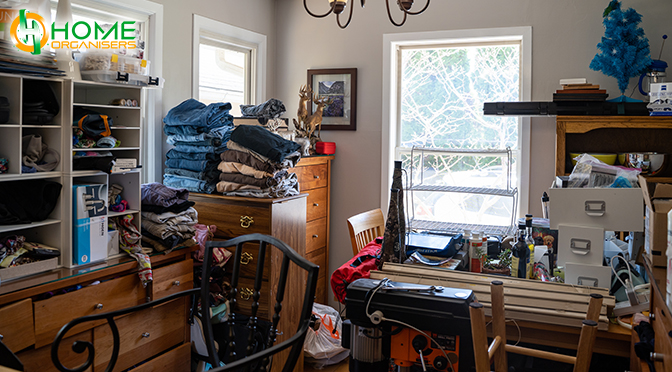Your chores become easier when you reduce your daily trash. If you are serious about making your home organized and clutter-free, you must embrace a disciplined lifestyle. According to Joshua Becker from one of his books, he shares some daily habits of clutter-free people for reducing clutter in their homes:
#1 Making their Beds
There is more reason behind your mom’s regular reminder that you should make your bed every morning when you are young. Joshua Becker says the condition of your bed can show the condition of other rooms in your home because it is the main piece of your bedroom. The entire room would not be well organized when your bed looks messed-up.
#2 They Complete each Task
Becker states that clutter in our home is mostly a result of procrastination, opting to underrate small tasks or leave it unfinished. You don’t have to procrastinate any simple task that can be done within few minutes. Don’t wait to remove the trash, put back the controller, or make your bed. Start doing the little task and avoid waiting until it becomes huge and thus take much of your time.

#3 They Get Rid of Junk
Do not accumulate junk on your countertops, tables, shelves, and much more; put them straight into the trash can. They have no importance than to form clutter in your home. You would be getting rid of the temptation to buy things you don’t need as well as save time when you get rid of promotional mail before opening it.
#4 They Leave No Dish in the Sink
Having dirty dishes stacked up in your sink is disgusting. Return your silverware and plates in the dishwasher immediately after eating to avoid accumulating it. You can as well wash them by hand to avoid piling them up in the sink.
#5 They Don’t Place Items on the Table
It is easier to have clutter on tables, dressers, counters, and other flat surfaces. To avoid cluttering your table, start locating a permanent location for objects instead of leaving them on your surfaces without thinking twice. Look out for items like kitchen appliances and toiletries that you forget to remove and clean them as required.
#6 They Don’t Leave Clothes on the Floor
Put your clothes where they supposed to be immediately you take them off. Clean clothes belong on the hanger while dirty ones belong in the hamper. Although it is easier to drop them on the bed, but to have a cleaner room, try and get them to their rightful place.

#7 They Recycle Newspapers and Magazines
You don’t need to keep an entire publication because you like one or two recipes or articles you would like to keep. Cut out the pages and clip them, and then keep them where you can easily access them while you dispose of the rest to avoid cluttering your home with old magazines.
#8 They Make an Effort to Find Garbage
Becker advised that you seize the opportunity of trash day to check your house for any removable trash thoroughly. Check your refrigerator, your old files, and your drawers.
#9 They Create Space for Coats
Because there is no space in your coat closet, it makes it difficult to keep and retrieve things immediately, and that’s why you have boots, outerwear, and coats littered everywhere in your home. Thoroughly clean your closet to create more space for your shoes. Also, open hangers so you can easily locate jackets without tossing everything.
#10 They Go Through the House Every Night
Get rid of clutter and sweep your home before going to bed to wake up to a clean and clutter-free home. Make sure your keys, bags, papers, and kids’ toys are kept in their rightful places.
Why Just 10 Things?
The secret behind how just 10 things work is hidden in some numbers and some nice techniques.
The Numbers
You will declutter 3,650 items annually if you get rid of just 10 things every day.
That’s a lot is clutter, right? Imagine reducing the number of things in your home by 3,000? That would leave your home with a lot of space, right? But there is much more beneficial to just 10 things technique than that.
This is where we consider the psychology aspect, the good and the bad ones.

- Bad Psychology
The truth is, there are lots of emotions living in all our mountain of belongings. Loneliness, love, anxiety, fear, and guilt are all there. And those are really powerful feelings. And the most decluttering process doesn’t help us with it all. One can easily get overwhelmed with decisions on what to do with the many loads we have on the floor. Decision fatigue begins to manifest. That is a really disastrous feeling, as it sends a signal to our brains that decluttering is a daunting and challenging task, and we should avoid engaging it. All we need is some good psychology to motivate us and manage our emotions.
- Good Psychology
Just 10 things take our emotions into consideration and make use of them while releasing some stuff. It begins with items we no longer need. We have different sizes of them hiding where we can see them in our homes.
We just get rid of 10 every day:
- No anxiety
- No guilt
- And NO decision fatigue.
We don’t take our piles of items, we make no mess, and we spend just 5 minutes on it. And this has a significant impact in our lives because from the first day; we get a feeling that:
- Decluttering is easy
- I will do more tomorrow
- And continue the next day
We let get rid of something every day to loosen clutter’s hold on us. We avoid the fear of unknown needs that may arise for a particular item, thereby making it difficult to let go. We rather get those items to those who need them around us.

FAQs about Home Decluttering:
- How can making the bed daily help reduce clutter?
Making your bed sets the tone for a tidy room, encouraging organisation throughout the day. - Why is completing each task important for staying clutter-free?
Finishing small tasks prevents clutter from building up and reduces procrastination. - How can decluttering junk help maintain a tidy home?
Removing unnecessary items from surfaces reduces visual clutter and maintains order. - How do clutter-free people manage dirty dishes?
They wash dishes immediately after use, preventing a pile-up in the sink. - What’s a key rule for keeping surfaces clutter-free?
Avoid leaving items like clothes or kitchen appliances on tables and counters; always put them back in their designated place. - How should clothes be handled to reduce mess?
Place clean clothes on hangers and dirty ones in a hamper immediately after use. - How do clutter-free individuals manage magazines and newspapers?
They clip relevant articles and recycle the rest to prevent paper clutter. - How does regular trash disposal contribute to a clutter-free home?
Checking for trash daily and discarding it helps keep all spaces clean and organised. - Why is creating space for coats important?
An organised coat area prevents jackets, shoes, and accessories from cluttering the home. - How does a nightly sweep of the house help maintain cleanliness?
Doing a quick cleanup before bed ensures that clutter doesn’t accumulate, leading to a peaceful and tidy morning.
Final Words
You are getting rid of just 10 items today, but as you let go of 10 things every day, it signals your brain that you can continue doing this every day, and this will result in getting rid of clutter from your home. Feel free to drop any cleaning tips and trick you have in the comment section below. In the coming weeks, we will sharing our expert “30-Day Home Organizing Challenge.” We promise it will be an eye-opener to you.
We will be delighted to assist you in any of your home declutter, cleaning, and organization. Contact us today for more inquiry on how we can help you!



